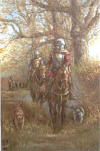The history of the Border
Reivers has many similarities to that of the American Wild West.
It produced its share of outlaws and broken men, corrupt officials,
greed, misery and struggle for survival. Arson, murder,
raiding were commonplace.
These times
produced its great characters such as Kinmont Willie, Wat of Harden, Little Jock
Elliot, and many others; it produced some humour, embellished
stories, and a lot of fiction.
There was glamour and a
lot of squalor.
It produced deceit, treachery but also great acts of loyalty and courage. It
produced the protection racket and extortion.
Notwithstanding, it
produced a fine, independent people with strong qualities of resilience
and resolution.
It produced the Borderers, with
their many descendants scattered throughout the world still displaying
those notable characteristics acquired through those
eventful and bloody years.
The end
of the Border Reivers
In 1603 James VI of Scotland became James I of England.
James immediately set about unifying the two countries.
The Marches and the posts of wardens
were abolished. The term 'the Borders' was forbidden. The region was to
be known as the Middle Shires.
Strong measures were pursued to enforce
the law and there was, after centuries of disorder, a will to see that
the law was enforced. Wanted men were hunted down and executed. All
Borderers were forbidden to carry weapons and they could only own horses
of a value up to 50 schillings.
Deprived of their basic reiving
requirements reiving activities gradually died away.
Reiving families were dispossessed of
their lands. Their homes were destroyed and the people scattered or
deported.
Some clans who had been active reivers
hastily abandoned their reiver connections and sought and found favour
with the king and joined in the subjugation of the old reiving families,
often with great enthusiasm. Many were rewarded with gifts of land, and
they prospered, acquiring the lands of their former friends and
allies. Their descendants are now securely entrenched with their
titles and vast holdings.
Thus many proud and fearless families were broken up and scattered
beyond their homeland. They were the Grahams, the Armstrongs, the
Elliots, the Routledges, Nixons and many others.
Only a few remained, adopting a
peaceful way of life. Others moved into England, Ireland America, and
elsewhere, where their descendents live and prosper to this day.
John Lesley, the Bishop of
Ross, wrote of the Border Reivers:
In time of war they were
readily reduced to extreme poverty by the almost daily inroads of the
enemy whence it happens they seek their substances by robberies or
plunder and rapine (for they are particularly averse to the shedding of
blood) nor do they much concern themselves whether it be from Scots or
English that they rob. They have a persuasion that all property is
common by law of nature.
The reiving families were not
religious people but it was said that they never said their prayers more fervently than before a raid.
|
